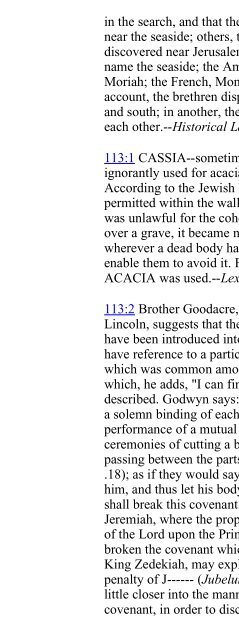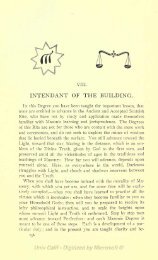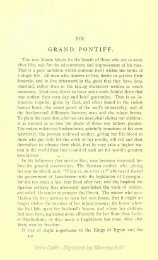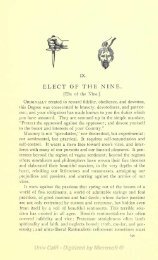- Page 2:
Title Page Preface Entered Apprenti
- Page 6:
p. 3 PREFACE THE objects which Free
- Page 10:
in any way injure the Masonic cause
- Page 14:
p. 6p. 7 DUNCAN'S RITUAL AND MONITO
- Page 18:
Degree. None but Master Masons are
- Page 22:
other arriving late should be ignor
- Page 26:
Entered Apprentice Mason: he was si
- Page 30:
Tyler--Without the inner door. W. M
- Page 34:
Lodge of such, duly assembled in a
- Page 38:
Treas.--In the south, Worshipful. W
- Page 42:
Entered Apprentice, the Master woul
- Page 46:
FIG. 2. SIGN OF AN ENTERED APPRENTI
- Page 50:
FIG. 6. SIGN OF A MASTER MASON. FIG
- Page 54:
First (or, as the case may be) Degr
- Page 58:
Mason, "Brothers, please retire," a
- Page 62:
Brother James B. Young, of Union Lo
- Page 66:
Petition of Robert Chase Fellow Cra
- Page 70:
p. 24 desirous of being admitted a
- Page 74:
Brother Jones--I move, Worshipful,
- Page 78:
S. W.--Clear (or not) in the west,
- Page 82:
Entered Apprentice Masons. The memb
- Page 86:
put it through the bosom of your sh
- Page 90:
door, and the Master says: W. M.--L
- Page 94:
"Behold, how good and how pleasant
- Page 98:
you travelling? S. D.--From the wes
- Page 102:
FIG. 8. CANDIDATE TAKING THE OATH O
- Page 106:
myself under no less penalty than t
- Page 110:
duegard, sign, and step of an Enter
- Page 114:
y the right hand.)--Rise, my brothe
- Page 118:
J. W.--What do you conceal? S. D.--
- Page 122:
ENTERED APPRENTICE'S APRON. conferr
- Page 126:
to the Worshipful Master in the eas
- Page 130:
others and fellows. (See Note F, Ap
- Page 134:
p. 43 Q. Z. A. Bo. Q. Az. A. Boaz.
- Page 138:
my naked left breast. Q. How were y
- Page 142:
A. The three great lights in Masonr
- Page 146:
on strict examination, I found myse
- Page 150:
Q. What were they? A. A listening e
- Page 154:
worldly wealth or honors; it is the
- Page 158:
Q. Why were you conducted once arou
- Page 162:
Q. What is a Lodge? A. A certain nu
- Page 166:
p. 52 Q. Why are they thus dedicate
- Page 170:
the Master on his trestle-board, so
- Page 174:
trouble to commit them to memory, a
- Page 178:
secrets of Masonry might be unlawfu
- Page 182:
citizen, true to your government, a
- Page 186:
PERFECT ASHLER Footnotes ROUGH ASHL
- Page 190:
extend--although we have no evidenc
- Page 194:
school as a most infamous and aband
- Page 198:
not see until the heart has conceiv
- Page 202:
p. 58 FELLOW CRAFT, OR SECOND DEGRE
- Page 206:
J. D.--Then you will take off your
- Page 210:
S. D.--And properly vouched for? J.
- Page 214:
While going around the Lodge, as th
- Page 218:
S. D. (for candidate.)--Brother Gab
- Page 222:
with your right foot, bringing the
- Page 226:
around the altar). OATH. I, Peter G
- Page 230:
of the duegard of a Fellow Craft. (
- Page 234:
Conductor - - From. W. M. - - From
- Page 238:
Conductor--By signs and tokens. J.
- Page 242:
Conductor--From the pass grip of a
- Page 246:
FELLOW CRAFT'S APRON W. M.--I now p
- Page 250:
After the candidate is dressed, the
- Page 254:
chapiters of five cubits each, maki
- Page 258:
Stepping forward to the five steps,
- Page 262:
spoils of the Ammonitish war, assem
- Page 266:
S. D.--Ja. S. W.--Chin. S. D.--Jach
- Page 270:
the vast expanse, and are all condu
- Page 274:
nature, is enriched with the most u
- Page 278:
degree of Fellow Craft. Q. What wer
- Page 282:
asked? A. What I most desired. Q. Y
- Page 286:
Craft. SECOND SECTION. Q. Have you
- Page 290:
Q. Were they adorned with any thing
- Page 294:
Q. What do the five steps allude to
- Page 298:
where I would be received and recor
- Page 302:
intrusted on the faith of a solemn
- Page 306:
p. 87 MASTER MASON, OR THIRD DEGREE
- Page 310:
COMPASSES, PLACED IN A LODGE OF MAS
- Page 314:
eing raised to the sublime Degree o
- Page 318:
S. D.--He is. W. M.--Has he made su
- Page 322:
are few; and those that look out of
- Page 326:
J. W.--Who vouches for him? S. D.--
- Page 330:
FIG. 14. FIRST THREE STEPS IN MASON
- Page 334:
of Almighty God, and this worshipfu
- Page 338:
Sign of Distress, except in case of
- Page 342:
Conductor FIG. 16. PASS GRIP OF A M
- Page 346:
Conductor--From the real grip of a
- Page 350:
W. M.--Brother Gabe, as you are clo
- Page 354:
or six strong loops on each side, i
- Page 358:
the matter of closing the Lodge, an
- Page 362:
they approach the Junior Warden's s
- Page 366:
left to right: S. D., or Conductor.
- Page 370:
Conductor (for candidate.)--I canno
- Page 374:
lower it to the floor, when the fol
- Page 378:
p. 108 conceal it so that the place
- Page 382:
night and steal a small boat and pu
- Page 386:
ethren, into the ante-room, leaving
- Page 390:
Capt.--They were three brothers, wo
- Page 394:
"Oh! that my throat had been cut ac
- Page 398:
vultures of the air, ere I had cons
- Page 402:
appertains to the Master's Degree,
- Page 406:
"My worthy brother of Tyre, as the
- Page 410:
For Mortality is here: See how wide
- Page 414:
uprising, and understandest our tho
- Page 418:
least this is a substitute, for, ac
- Page 422:
"4th. Hand to back--that you will e
- Page 426:
p. 123 The ruffians buried the body
- Page 430:
The first was the voice of Jubela,
- Page 434:
have been explained to you. The bod
- Page 438:
Crafts, or hewers on the mountains
- Page 442:
gratitude to the great and benefice
- Page 446:
perform their stupendous revolution
- Page 450:
Is an emblem of time, which cuts th
- Page 454:
with him enter into an endless eter
- Page 458:
with hands, eternal in the heavens,
- Page 462: with it. The lecture is as follows:
- Page 466: equest, and his answer returned. Q.
- Page 470: A. The Worshipful Master approachin
- Page 474: A. Our Grand Master, Hiram Abiff, w
- Page 478: Q. How was his absence discovered?
- Page 482: horrid exclamations from the clefts
- Page 486: A. Three Master Masons. Q. Where di
- Page 490: your desk? Sec.--Nothing, Worshipfu
- Page 494: S. W.--In search of that which was
- Page 498: the east (here the Master gives thr
- Page 502: temperate, discreet. Remember that
- Page 506: ecommendation to all Lodges and bre
- Page 510: Dr. Hemming. That Tubal Cain gave f
- Page 516: the different penalties as referenc
- Page 520: esurrection of the body, and while
- Page 524: after the Revival in 1717, for the
- Page 528: tomb was in the rubbish and filth c
- Page 532: p. 150 MARK MASTER, OR FOURTH DEGRE
- Page 536: The interior arrangements of the Lo
- Page 540: R. W. M.--Your duty there, Brother
- Page 544: R. W. M.--Your duty there, Brother
- Page 548: in the south, that the brethren may
- Page 552: fingers of the right hand, leaving
- Page 556: p. 157 living stone, disallowed ind
- Page 560: Sometimes this stone weighs twelve
- Page 564:
Candidate--It is not. Junior Overse
- Page 568:
Overseer catches it over the left s
- Page 572:
As they finish the second verse, ea
- Page 576:
inexperience, the penalty is remitt
- Page 580:
J. D.--He has. S. D.--By what furth
- Page 584:
And have you not read this Scriptur
- Page 588:
most solemnly and sincerely promise
- Page 592:
supplied you with that amount, unkn
- Page 596:
FIG. 23. PASS-GRIP OF A MARK MASTER
- Page 600:
The Senior Warden takes the stone f
- Page 604:
HIRAM, TYRIAN, WIDOW'S SON, SENDETH
- Page 608:
destroy, The soul's calm sunshine,
- Page 612:
conduct should misfortunes assail y
- Page 616:
them, Go ye also into the vineyard,
- Page 620:
A. They were not, for King Solomon
- Page 624:
quarries and exhibited suitable spe
- Page 628:
Worshipful Master. Q. How did the R
- Page 632:
Q. To what does it allude? p. 180 A
- Page 636:
which was upon it, and concluding i
- Page 640:
A. While on my bended knees at the
- Page 644:
Supreme Grand Architect of the Univ
- Page 648:
the very spot for their appropriati
- Page 652:
p. 184 PAST MASTER, OR FIFTH DEGREE
- Page 656:
Richardson's work, the initiated wi
- Page 660:
members exclaim, No!) It is not a v
- Page 664:
12. You promise a regular attendanc
- Page 668:
Degree of Mark Master, or been elec
- Page 672:
giving a lecture, or some section o
- Page 676:
R. W. M.--Brother, let me now have
- Page 680:
and Senior Deacons; two strokes cal
- Page 684:
one obeys the signal with the utmos
- Page 688:
design. He (the candidate) sits the
- Page 692:
p. 196 for it was doubtful to many
- Page 696:
A. Kneeling upon both knees, both h
- Page 700:
Bible, square and compasses. Within
- Page 704:
Footnotes 184:1 The regular officer
- Page 708:
necessary instructions p. 197 are c
- Page 712:
The officers of a Chapter rank as f
- Page 716:
implements of his office. Master--H
- Page 720:
The Right Worshipful Master resumes
- Page 724:
Junior Deacon whispers in the ear o
- Page 728:
"I was glad when they said unto me,
- Page 732:
hereon, most solemnly and sincerely
- Page 736:
Furthermore do I promise and swear,
- Page 740:
Excellent Master's Song: All hail t
- Page 744:
Wherever assembled, The knowledge o
- Page 748:
is good (here one of the brethren,
- Page 752:
thy staff they comfort me. Thou pre
- Page 756:
Q. What was his answer? A. Let the
- Page 760:
Q. Show me another sign. (Give sign
- Page 764:
assembly, dedicated or consecrated
- Page 768:
work, in the centre of which a mort
- Page 772:
deemed appropriate to their occupat
- Page 776:
p. 219 The Grand Council consists o
- Page 780:
Master of the Second Veil, 11. Gran
- Page 784:
to sit in the Grand Council, to for
- Page 788:
instructs us that in the mind of a
- Page 792:
The companions now all balance thre
- Page 796:
Je ho vah. G o d. d G G o o d. 1 Af
- Page 800:
First Candidate (prompted.)--It is.
- Page 804:
Brethren, as you advance in Masonry
- Page 808:
America; together with that of the
- Page 812:
creatures, didst adorn us with grea
- Page 816:
One of the members now personates t
- Page 820:
Captain of the Host goes and opens
- Page 824:
themselves with the fraternity. I h
- Page 828:
Master of First Veil--Who comes the
- Page 832:
the Second Veil. (Stamps on the flo
- Page 836:
hand into thy p. 238 bosom. And he
- Page 840:
glorious work of rebuilding the hou
- Page 844:
the workmen, none are allowed to un
- Page 848:
such, we will employ you on the Tem
- Page 852:
High Priest (looking closely at it.
- Page 856:
Scribe--Nothing, Most Excellent. Hi
- Page 860:
"In the beginning, God created the
- Page 864:
King--A Pot of Manna! Holiness to t
- Page 868:
The second way to read the alphabet
- Page 872:
p. 250 places his right foot forwar
- Page 876:
The High Priest then reads to them
- Page 880:
It is generally conceded by Masonic
- Page 884:
and Scribe, Captain of the Host, Pr
- Page 888:
permitted to enter the presence of
- Page 892:
Q. What was then said to you? A. We
- Page 896:
exhibited to you at this point of y
- Page 900:
A. We are of your own brethren and
- Page 904:
Q. What were you then asked? A. By
- Page 908:
have come thus far to promote so no
- Page 912:
together with the signet. Q. What w
- Page 916:
A. We repaired to the place as befo
- Page 920:
sides to be the initials of our thr
- Page 924:
equally near and equally dear. Q. W
- Page 928:
in use among the different nations
- Page 932:
some of Zerubbabel's workmen. But t
- Page 936:
say, instead of JAO-BUL-ON, or JAH-
- Page 940:
secret vault under ground, leading
- Page 944:
Such is the Masonic and literal tra
- Page 948:
selfish consideration, I will be ev
- Page 952:
ORIGINAL POINTS.--Ancient Masonry a
- Page 956:
p. 270 import and ideas change with
- Page 960:
p. 271 APPENDIX. NOTE A, page 12.--
- Page 964:
captives to Babylon, where we remai
- Page 968:
down to rest and refresh himself. Q
- Page 972:
her left, that his ashes were then
- Page 976:
Q. By whom are they represented? A.
- Page 980:
Address of M. W. P. Al. Tucker, G.
- Page 984:
(as Professor of Astronomy and Geog
- Page 988:
them as matters of fact and princip
- Page 992:
Lodges of this city--and in view of
- Page 996:
Freemasonry. "Inaugurate a new era.






